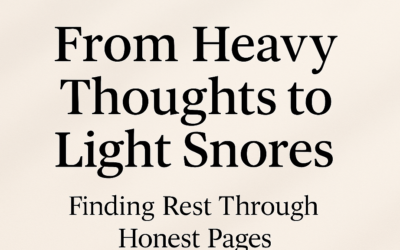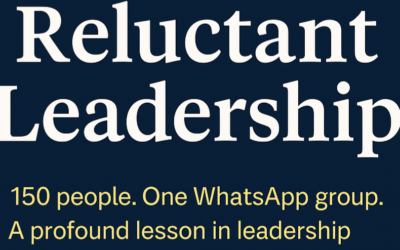It was October 2009, six months after I had resigned from my job. I wasn’t very clear on what was next, only that I craved independence and flexibility more than the security of a paycheck.
I was in my room, sitting on my bed, putting finishing touches to the first email announcing the HR Bootcamp Conference. My hands were going back and forth on pressing the send button on my keyboard. Then, trembling, I did it. I hit the send button. In the same instance, I slammed my laptop shut, jumped off the bed, and ran out of the room, as though the email I had just sent was a missile targeted to hit me. I still smile at the theatrics of it all. Why was I running? Fear? I guess. Fear makes people do strange things.
Why was I scared? Because in that instant, I had declared to the world that I was in business. There was no turning back. I was vulnerable to rejection, exposed to failure. What if no one signed up? What if I had to cancel the event?
That day taught me something important about career transitions: they are not smooth or glamorous. They are messy, vulnerable, and filled with doubt. Yet, they are also where growth begins. Over the years, I’ve come to see these transitions through what I call the 3Cs: Clarity, Courage, and Change, and if you stay with me, I will show you how it played out in my own journey…which by the way, I am still on.
Clarity: Casting a Vision and Knowing What You Don’t Want
The first C is Clarity. Clarity is the compass. It doesn’t mean figuring out every detail; it is about knowing the direction you want to go. I often liken it to booking an Uber or using Google Maps. You must decide where you are going in the first instance. For me, clarity often starts with casting a vision. That means painting a picture of the career and life I want, setting goals, and most importantly, writing them down. I believe deeply in the power of writing because it embeds those goals into the subconscious, which then guides your choices and actions. In my book of wisdom (with very few entries), writing goals down is a top item.
I experienced this firsthand with my company, Kendor. From choosing the name to defining its mission to imagining the products and services, I wrote everything down in my journal in 2009. I still do this every year: sitting with my journal, reflecting on the past year’s goals and exploring new goals. I also read the goals written in my old journals, reflecting and marvelling on how over 90% of them have come to pass. Writing down goals is one of the true wonders of life, and the reason I always encourage everyone to write down their goals.
Clarity also has a powerful flip side. Sometimes it doesn’t come from knowing exactly what you want; it can come from knowing what you don’t want or will no longer tolerate. I often reflect on what I no longer want to do, what I refuse to tolerate, and what consistently causes me distress. Those “don’ts” often shine a light on what I do want.
For me, in 2009 the non-negotiables were independence and flexibility, and over the years I have added quite a bit to my ‘do not want’ list. There’s also the ‘do not want anymore’ list. This acknowledges that we evolve and are not trapped by previous versions of ourselves. I have watched some of my wants switch to the other side as my priorities change. I still value freewill, perhaps a little more than most people. I cherish the flexibility of doing things on my own terms, especially when it comes to how I spend my time. I’ve never followed crowds. In fact, I consciously tend to go wherever the crowd is not going. I’m curious like that, sometimes even a little risqué. Clarity helps alot with decision-making. Once you are clear on your wants and don’t wants, you can say yes to the things that align with our vision and no to the things that don’t.
Courage: Doing It Afraid
Clarity sets the direction, but courage fuels the journey. People often call me bold, but I don’t always feel that way. I am almost certain I am not bold by most standards, as fear shows up with almost every big step I take. The difference is that I have learned to act despite my fears. I don’t let fear immobilise my actions.
Sending that finger-trembling HR Bootcamp email is my clearest memory of courage. Pressing “send” made me vulnerable to rejection, but it also moved me forward. I moved with fear still very much in the room. Fear even chased me out of the room.
I also have an interesting relationship with money. Some may call it an abundance mindset. I don’t fear being broke. What I see, time and again, is that money follows value creation. I love solving problems, and people pay to get their problems solved. That conviction steadies me when uncertainty threatens to overwhelm me. I truly believe that money leaves trails, and you can follow the money trail by solving problems if you need it so much.
I don’t fear uncertainty; in fact, there’s an adventurous part of it that excites me. What I do fear is helplessness, the feeling of having no say over my time or choices. That fear pushes me to act, especially when I am afraid. I think of the alternative, which is a life I don’t want, and I decide to take my chances. When I don’t get the results I want (I don’t believe in failure, only lessons), I am at peace knowing that my best may not be good enough, but at least I tried.
Change: Acting Before Doubt Wins
The third C is Change, where clarity and courage come full circle. Change is not thinking about the action; it is taking the action itself.
That first trembling email was my act of change. I took action, and any action is a force which sets things in motion. Progress quickly follows action.
I will never forget the day the first person signed up for HR Bootcamp. I jumped up, screamed, and celebrated like it was a major victory. It felt surreal; proof that someone out there believed in the vision. When the second and third people signed up, I told myself, ‘The hall will not be empty. I must give it my best shot.’
Each additional sign-up was a moment of wonder. 75 participants attending a first-ever, physical, paid event felt nothing short of miraculous. That experience taught me something powerful: progress is the greatest motivator. And this is why I insist that action must be taken, because you cannot progress where there is no action.
Change is rarely nicely ordered or comfortable, but it is always the bridge between where you are and where you want to be.
Final Thoughts
If you’re standing at the edge of a career transition, don’t wait for perfect clarity, total fearlessness, or the “right time.” Instead:
- Cast a vision, set goals, and write them down
- Remember that sometimes clarity comes from what you no longer want to tolerate
- Take courageous steps even while fear whispers or even shouts
- Act quickly, before doubt talks you out of it, because progress will motivate you further than you imagined
Career transitions are not built on perfect timing. They are built on small, trembling steps of clarity, courage, and change, the practical steps that turn your vision into reality. I truly hope this helps.
This was my story, but it could just as easily be yours.
Adora Ikwuemesi is the author of Change Your Career and founder of Kendor Consulting. She writes about leadership, work, and navigating change with clarity and courage





0 Comments